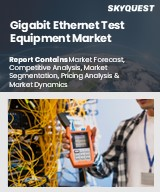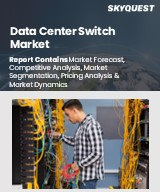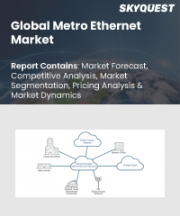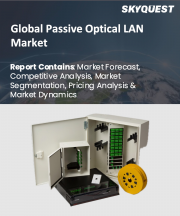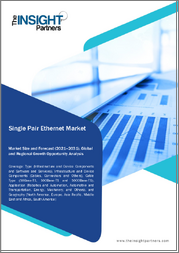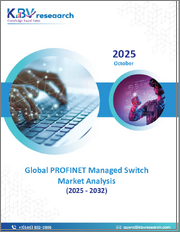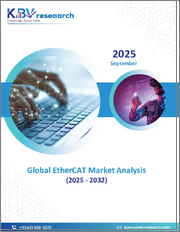
|
시장보고서
상품코드
1839321
EtherCAT 시장 규모, 점유율, 업계 분석 리포트 : 컴포넌트별, 디바이스 유형별, 최종 용도별, 지역별 전망 및 예측(2025-2032년)Global EtherCAT Market Size, Share & Industry Analysis Report By Component (Hardware, Software, and Services), By Device Type (Master Controllers, I/O Modules, Slave Controllers, and Gateways), By End Use, By Regional Outlook and Forecast, 2025 - 2032 |
||||||
EtherCAT 시장 규모는 예측 기간 중 9.3%의 CAGR로 시장 성장하며, 2032년까지 48억 2,000만 달러에 달할 것으로 예상되고 있습니다.
주요 하이라이트:
- 북미 시장은 2024년 EtherCAT 시장을 장악하고 2024년 35.00%의 매출 점유율을 차지했습니다.
- 미국 시장은 2032년까지 시장 규모가 11억 1,000만 달러에 달할 것으로 예상되며, 북미 시장에서의 리더십을 유지할 것으로 예측됩니다.
- 다양한 구성 요소 중 하드웨어 부문은 2024년 51.12%의 매출 점유율을 차지하며 세계 시장을 장악했습니다.
- 장치 유형별로는 마스터 컨트롤러 부문이 2032년까지 36.17%의 매출 점유율을 차지하며 세계 시장을 주도할 것으로 예측됩니다.
- 자동차 및 운송 시장은 2024년 주요 최종 용도로 부상하여 26.36%의 매출 점유율을 차지하며, 예측 기간 중에도 그 우위를 유지할 것으로 예측됩니다.
EtherCAT은 짧은 사이클 타임, 비용 효율성 및 실시간 성능으로 산업용 이더넷 통신에 혁신을 가져왔습니다. EtherCAT Technology Group은 EtherCAT의 급속한 보급, 상호운용성 테스트 및 표준화에 중요한 역할을 했습니다. 그 결과, EtherCAT은 세계 표준 규격으로 통합되어 자동차, 반도체, 로봇공학, 공정 자동화 등의 분야로 적용이 확대되었습니다. 시간이 지남에 따라 Safety-over-EtherCAT 이중화, 고급 진단 기능 및 진단 기능 향상과 같은 기능을 갖춘 기술이 크게 발전했으며, ETG 생태계의 확장은 산업 전반에 걸쳐 EtherCAT의 보급과 혁신을 가속화했습니다.
EtherCAT 시장은 진단, 이중화, 안전성 등의 요소로 인해 예측 기간 중 크게 확대될 것으로 예측됩니다. 시장의 주요 기업은 표준 준수, 생태계 강점, 상호운용성, 기술 성능 등을 놓고 경쟁하고 있습니다. 시장 기업은 인증, 제휴, 제품 혁신 등의 전략을 통해 자동차, 의료기기, 항공우주, 로봇공학 등 수요가 많은 산업을 공략하고 있습니다. EtherCAT 시장은 고성능의 프리미엄 디바이스에 힘입어 특정 분야를 타겟으로 한 높은 성장세를 보이고 있지만, 비용에 민감한 부문도 눈에 띄게 성장하고 있습니다. 최근 수년간 EtherCAT은 생태계의 성장, 치열한 시장 경쟁 및 기술 발전에 힘입어 산업 자동화 통신 표준의 중요한 부분으로 발전하고 있습니다.
시장 점유율 분석
COVID-19의 영향 분석
COVID-19 팬데믹은 공급망, 제조, 물류에 혼란을 가져왔고, EtherCAT 시장에 큰 영향을 미쳤습니다. 원자재 수급의 제한과 지연으로 인해 EtherCAT 장치의 생산 및 유통이 정체되었습니다. 동시에 자동차, 항공우주, 일반 제조업 등의 산업 활동 감소도 수요를 감소시켰습니다. 많은 자동화 및 스마트팩토리 프로젝트가 경제적 불확실성으로 인해 중단되거나 중단되었습니다. 이는 솔루션 프로바이더의 수입원에 악영향을 미쳤습니다. 현장 작업 인원이 적고 이동에 제약이 있으며, 설치, 유지보수, 기술지원이 더욱 어려웠습니다. 그 결과, 신규 시스템 도입과 기존 EtherCAT 네트워크의 유지관리가 모두 지연되었습니다. 이처럼 COVID-19 팬데믹은 시장에 부정적인 영향을 미쳤습니다.
장치 유형 전망
장치 유형에 따라 시장은 마스터 컨트롤러, I/O 모듈, 슬레이브 컨트롤러, 게이트웨이로 분류됩니다. I/O 모듈 부문은 2024년 EtherCAT 시장에서 32%의 매출 점유율을 기록했습니다. I/O 모듈 부문은 컨트롤러와 필드 장치 간의 중요한 인터페이스 역할을 하며, 입출력 신호의 수집 및 전송을 가능하게 합니다. 이 모듈은 다양한 센서, 액추에이터 및 기타 현장 장비를 연결할 수 있는 유연성을 제공하며, 자동화 프레임워크에 필수적인 역할을 합니다.
최종 용도 전망
최종 용도에 따라 시장은 자동차 및 운송, 전기 및 전자, 에너지 및 전력/석유 및 가스, 항공우주 및 방위, 제약 및 의료기기, 금속 성형 및 조립, 식품 및 음료로 분류됩니다. 전기 및 전자 부문은 2024년 EtherCAT 시장에서 21%의 매출 점유율을 차지했습니다.전기 및 전자 부문은 정밀도와 동기화가 요구되는 고도로 복잡한 제조 공정을 관리하기 위해 EtherCAT을 활용하고 있습니다. 소비자용 전자기기, 반도체, 첨단 회로기판 수요가 증가함에 따라 효율적인 자동화 시스템의 필요성이 높아지고 있습니다.
지역 전망
지역별로 EtherCAT 시장은 북미, 유럽, 아시아태평양, LAMEA, 기타 지역으로 분석되고 있습니다. 북미 부문은 2024년 EtherCAT 시장에서 35%의 매출 점유율을 기록할 것으로 예측됩니다. 북미와 유럽에서는 EtherCAT 시장이 크게 성장할 것으로 예측됩니다. 이는 실시간 제어, 정확성, 안전성이 중요한 로봇공학, 자동차, 포장, 반도체, 제조 산업에서 높은 호응을 얻고 있습니다. 이 지역은 또한 EtherCAT의 통합을 가속화하는 잘 구축된 OEM, 발달된 산업 자동화 생태계의 이점을 누리고 있습니다. 또한 스마트 팩토리와 IoT의 지속적인 혁신, 엄격한 컴플라이언스 프레임워크, 안전 및 상호운용성에 대한 강조는 미션 크리티컬한 용도에 EtherCAT을 장기적으로 통합할 수 있도록 보장합니다.
EtherCAT 시장은 아시아태평양 및 LAMEA 지역에서 확대될 것으로 예측됩니다. 이 시장은 급속한 산업화, 자동화 기술에 대한 투자 증가, 제조 거점 확대에 힘입어 성장하고 있습니다. 인도, 한국, 중국, 일본과 같은 지역 국가에서는 동기식 작동과 높은 처리량 요구로 인해 전자기기, 반도체, 자동차 산업에서 EtherCAT의 채택이 빠르게 진행되고 있습니다. 또한 LAMEA 지역에서도 공정 자동화, 에너지 및 제조 기지 개발에서 EtherCAT에 대한 관심이 높아지면서 시장 확대를 주도하고 있습니다. 디지털화가 진행됨에 따라 EtherCAT의 확장성, 비용 효율성 및 유연성은 보다 광범위한 도입을 지원할 것으로 예측됩니다.
목차
제1장 시장 범위와 조사 방법
- 시장의 정의
- 목적
- 시장 범위
- 세분화
- 조사 방법
제2장 시장 개관
- 주요 하이라이트
제3장 시장 개요
- 서론
- 개요
- 시장 구성과 시나리오
- 개요
- 시장에 영향을 미치는 주요 요인
- 시장 성장 촉진요인
- 시장 성장 억제요인
- 시장 기회
- 시장이 해결해야 할 과제
제4장 시장 동향 - EtherCAT 시장
제5장 경쟁 상황 - 세계의 시장
제6장 EtherCAT 시장의 밸류체인 분석
제7장 제품수명주기 - EtherCAT 시장
제8장 시장 통합 - EtherCAT 시장
제9장 주요 고객 기준 - EtherCAT 시장
제10장 경쟁 분석 - 세계
- 시장 점유율 분석, 2024년
- Porter's Five Forces 분석
제11장 세계의 EtherCAT 시장 : 컴포넌트별
- 세계의 하드웨어 시장 : 지역별
- 세계의 소프트웨어 시장 : 지역별
- 세계의 서비스 시장 : 지역별
제12장 세계의 EtherCAT 시장 : 디바이스 유형별
- 세계의 마스터 컨트롤러 시장 : 지역별
- 세계의 I/O 모듈 시장 : 지역별
- 세계의 슬레이브 컨트롤러 시장 : 지역별
- 세계의 게이트웨이 시장 : 지역별
제13장 세계의 EtherCAT 시장 : 최종 용도별
- 세계의 자동차·운송 시장 : 지역별
- 세계의 전기·전자기기 시장 : 지역별
- 세계의 에너지·전력/석유 및 가스 시장 : 지역별
- 세계의 항공우주·방위 시장 : 지역별
- 세계의 의약품·의료기기 시장 : 지역별
- 세계의 금속 성형·조립 시장 : 지역별
- 세계의 식품 및 음료 시장 : 지역별
제14장 세계의 EtherCAT 시장 : 지역별
- 북미
- 시장에 영향을 미치는 주요 요인
- 북미의 시장 : 국가별
- 미국
- 캐나다
- 멕시코
- 기타 북미 지역
- 북미의 시장 : 국가별
- 유럽
- 시장에 영향을 미치는 주요 요인
- 유럽의 시장 : 국가별
- 독일
- 영국
- 프랑스
- 러시아
- 스페인
- 이탈리아
- 기타 유럽 지역
- 유럽의 시장 : 국가별
- 아시아태평양
- 시장에 영향을 미치는 주요 요인
- 아시아태평양의 시장 : 국가별
- 중국
- 일본
- 인도
- 한국
- 싱가포르
- 말레이시아
- 기타 아시아태평양
- 아시아태평양의 시장 : 국가별
- 라틴아메리카·중동 및 아프리카
- 시장에 영향을 미치는 주요 요인
- 라틴아메리카·중동 및 아프리카의 시장 : 국가별
- 브라질
- 아르헨티나
- 아랍에미리트
- 사우디아라비아
- 남아프리카공화국
- 나이지리아
- 기타 라틴아메리카·중동 및 아프리카 지역
- 라틴아메리카·중동 및 아프리카의 시장 : 국가별
제15장 기업 개요
- Siemens AG
- Omron Corporation
- Mitsubishi Electric Corporation
- Schneider Electric SE
- ABB Ltd
- Beckhoff Automation GmbH & Co KG
- Delta Electronics, Inc
- Bosch Rexroth AG(Robert Bosch GmbH)
- Rockwell Automation, Inc
- Infineon Technologies AG
제16장 EtherCAT 시장의 성공 필수 조건
KSA 25.10.24The Global EtherCAT Market size is expected to reach USD 4.82 billion by 2032, rising at a market growth of 9.3% CAGR during the forecast period.
Key Highlights:
- The North America market dominated Global EtherCAT Market in 2024, accounting for a 35.00% revenue share in 2024.
- The U.S. market is projected to maintain its leadership in North America, reaching a market size of USD 1.11 billion by 2032.
- Among the various Component, the Hardware segment dominated the global market, contributing a revenue share of 51.12% in 2024.
- In terms of Device Type, Master Controllers segment are expected to lead the global market, with a projected revenue share of 36.17% by 2032.
- The Automotive & Transportation market emerged as the leading End Use in 2024, capturing a 26.36% revenue share, and is projected to retain its dominance during the forecast period.
EtherCAT has transformed industrial Ethernet communication with its short cycle times, cost efficiency, and real-time performance. The EtherCAT Technology Group played a crucial role in surging adoption, interoperability testing, and standardization. This has resulted in the integration of EtherCAT into global standards, and extended applications into automotive, semiconductors, robotics, and process automation. With time, there has been significant developments in technologies with features such as safety-over-EtherCAT redundancy, advanced diagnostics, and improved diagnostics, while the ETG's expanding ecosystem accelerated industry-wide adoption and innovation.
The EtherCAT market has witnessed significant expansion in the forecast period due to elements such as diagnostics, redundancy, and safety. Key players in the market are competing on compliance with standards, ecosystems strength, interoperability, and technical performance. Market players are adopting strategies such as certification, alliances, product innovation, and targeting industries with larger demand, including automotive, medical devices, aerospace, and robotics. The EtherCAT market is experiencing high growth backed by high-performance and premium devices, targeting specialized sectors; however, cost-sensitive segments are also noticeable in the market. Recently, EtherCAT has developed into an important part of the communication standard for industrial automation, supported by ecosystem growth, strong market competition, and technical advancements.
Market Share Analysis
COVID 19 Impact Analysis
The COVID-19 pandemic had a big effect on the global EtherCAT market by messing up supply chains, manufacturing, and logistics. Restrictions and delays in getting raw materials slowed the production and distribution of EtherCAT devices. At the same time, less activity in industries like automotive, aerospace, and general manufacturing lowered demand. A lot of automation and smart factory projects were put on hold or canceled because of financial uncertainty. This hurt solution providers' revenue streams. Installation, maintenance, and technical support were made even harder by having a small number of workers available on-site and travel restrictions. This delayed both the deployment of new systems and the upkeep of existing EtherCAT networks. Thus, the COVID-19 pandemic had a negative impact on the market.
Device Type Outlook
Based on Device Type, the market is segmented into Master Controllers, I/O Modules, Slave Controllers, and Gateways. The I/O modules segment recorded 32% revenue share in the EtherCAT market in 2024. The I/O modules segment acts as a vital interface between controllers and field devices, enabling the collection and transmission of input and output signals. These modules provide the flexibility to connect a wide range of sensors, actuators, and other field equipment, making them indispensable in automation frameworks.
End Use Outlook
Based on End Use, the market is segmented into Automotive & Transportation, Electrical & Electronics, Energy & Power / Oil & Gas, Aerospace & Defense, Pharmaceutical & Medical Devices, Metal Forming & Assembly, and Food & Beverages. The electrical & electronics segment gained 21% revenue share in the EtherCAT Market in 2024. The electrical and electronics segment leverages EtherCAT to manage highly complex manufacturing processes that require precision and synchronization. The growing demand for consumer electronics, semiconductors, and advanced circuit boards has amplified the need for efficient automation systems.
Regional Outlook
Region-wise, the EtherCAT Market is analyzed across North America, Europe, Asia Pacific, and LAMEA. The North America segment recorded 35% revenue share in the EtherCAT Market in 2024. In North America and Europe, the EtherCAT market is expected to grow at a significant rate. This is supported by strong acceptance in robotics, automotive, packaging, semiconductor, and manufacturing industries, where real-time control, precision, and safety are important. The region also gets advantages from well-established OEMs, a developed industrial automation eco-system, which surge the integration of EtherCAT. Furthermore, continuous innovations in smart factories and IoT, along with strict compliance frameworks and a focus on safety and interoperability ensuring long-term integration of EtherCAT in mission-critical applications.
The EtherCAT market is estimated to experience expansion in the Asia Pacific and LAMEA region. The market is majorly driven by rapid industrialization, rising investment in automation technologies, and growing manufacturing bases. Regional nations such as India, South Korea, China, and Japan is having strong adoption of EtherCAT in electronics, semiconductors, and automotive industries because of the need for synchronized operations, and high throughput. Furthermore, the LAMEA region is also witnessing expansion driven by growing interest in EtherCAT for process automation, energy, and developing manufacturing hubs. With the increased digitalization, EtherCAT's scalability, cost-efficiency, and flexibility are anticipated to support wider deployment.
List of Key Companies Profiled
- Siemens AG
- Omron Corporation
- Mitsubishi Electric Corporation
- Schneider Electric SE
- ABB Ltd.
- Beckhoff Automation GmbH & Co. KG
- Delta Electronics, Inc.
- Bosch Rexroth AG (Robert Bosch GmbH)
- Rockwell Automation, Inc.
- Infineon Technologies AG
Global EtherCAT Market Report Segmentation
By Component
- Hardware
- Software
- Services
By Device Type
- Master Controllers
- I/O Modules
- Slave Controllers
- Gateways
By End Use
- Automotive & Transportation
- Electrical & Electronics
- Energy & Power / Oil & Gas
- Aerospace & Defense
- Pharmaceutical & Medical Devices
- Metal Forming & Assembly
- Food & Beverages
By Geography
- North America
- US
- Canada
- Mexico
- Rest of North America
- Europe
- Germany
- UK
- France
- Russia
- Spain
- Italy
- Rest of Europe
- Asia Pacific
- China
- Japan
- India
- South Korea
- Singapore
- Malaysia
- Rest of Asia Pacific
- LAMEA
- Brazil
- Argentina
- UAE
- Saudi Arabia
- South Africa
- Nigeria
- Rest of LAMEA
Table of Contents
Chapter 1. Market Scope & Methodology
- 1.1 Market Definition
- 1.2 Objectives
- 1.3 Market Scope
- 1.4 Segmentation
- 1.4.1 Global EtherCAT Market, by Component
- 1.4.2 Global EtherCAT Market, by Device Type
- 1.4.3 Global EtherCAT Market, by End Use
- 1.4.4 Global EtherCAT Market, by Geography
- 1.5 Methodology for the research
Chapter 2. Market at a Glance
- 2.1 Key Highlights
Chapter 3. Market Overview
- 3.1 Introduction
- 3.1.1 Overview
- 3.1.1.1 Market Composition and Scenario
- 3.1.1 Overview
- 3.2 Key Factors Impacting the Market
- 3.2.1 Market Drivers
- 3.2.2 Market Restraints
- 3.2.3 Market Opportunities
- 3.2.4 Market Challenges
Chapter 4. Market Trends - EtherCAT Market
Chapter 5. State of Competition - Global EtherCAT Market
Chapter 6. Value Chain Analysis of EtherCAT Market
Chapter 7. Product Life Cycle - EtherCAT Market
Chapter 8. Market Consolidation - EtherCAT Market
Chapter 9. Key Customer Criteria - EtherCAT Market
Chapter 10. Competition Analysis - Global
- 10.1 Market Share Analysis, 2024
- 10.2 Porter Five Forces Analysis
Chapter 11. Global EtherCAT Market by Component
- 11.1 Global Hardware Market by Region
- 11.2 Global Software Market by Region
- 11.3 Global Services Market by Region
Chapter 12. Global EtherCAT Market by Device Type
- 12.1 Global Master Controllers Market by Region
- 12.2 Global I/O Modules Market by Region
- 12.3 Global Slave Controllers Market by Region
- 12.4 Global Gateways Market by Region
Chapter 13. Global EtherCAT Market by End Use
- 13.1 Global Automotive & Transportation Market by Region
- 13.2 Global Electrical & Electronics Market by Region
- 13.3 Global Energy & Power / Oil & Gas Market by Region
- 13.4 Global Aerospace & Defense Market by Region
- 13.5 Global Pharmaceutical & Medical Devices Market by Region
- 13.6 Global Metal Forming & Assembly Market by Region
- 13.7 Global Food & Beverages Market by Region
Chapter 14. Global EtherCAT Market by Region
- 14.1 North America EtherCAT Market
- 14.2 Key Factors Impacting the Market
- 14.2.1 Market Drivers
- 14.2.2 Market Restraints
- 14.2.3 Market Opportunities
- 14.2.4 Market Challenges
- 14.2.5 Market Trends - North America EtherCAT Market
- 14.2.6 State of Competition - North America EtherCAT Market
- 14.2.7 North America EtherCAT Market by Component
- 14.2.7.1 North America Hardware Market by Country
- 14.2.7.2 North America Software Market by Country
- 14.2.7.3 North America Services Market by Country
- 14.2.8 North America EtherCAT Market by Device Type
- 14.2.8.1 North America Master Controllers Market by Country
- 14.2.8.2 North America I/O Modules Market by Country
- 14.2.8.3 North America Slave Controllers Market by Country
- 14.2.8.4 North America Gateways Market by Country
- 14.2.9 North America EtherCAT Market by End Use
- 14.2.9.1 North America Automotive & Transportation Market by Country
- 14.2.9.2 North America Electrical & Electronics Market by Country
- 14.2.9.3 North America Energy & Power / Oil & Gas Market by Country
- 14.2.9.4 North America Aerospace & Defense Market by Country
- 14.2.9.5 North America Pharmaceutical & Medical Devices Market by Country
- 14.2.9.6 North America Metal Forming & Assembly Market by Country
- 14.2.9.7 North America Food & Beverages Market by Country
- 14.2.10 North America EtherCAT Market by Country
- 14.2.10.1 US EtherCAT Market
- 14.2.10.1.1 US EtherCAT Market by Component
- 14.2.10.1.2 US EtherCAT Market by Device Type
- 14.2.10.1.3 US EtherCAT Market by End Use
- 14.2.10.2 Canada EtherCAT Market
- 14.2.10.2.1 Canada EtherCAT Market by Component
- 14.2.10.2.2 Canada EtherCAT Market by Device Type
- 14.2.10.2.3 Canada EtherCAT Market by End Use
- 14.2.10.3 Mexico EtherCAT Market
- 14.2.10.3.1 Mexico EtherCAT Market by Component
- 14.2.10.3.2 Mexico EtherCAT Market by Device Type
- 14.2.10.3.3 Mexico EtherCAT Market by End Use
- 14.2.10.4 Rest of North America EtherCAT Market
- 14.2.10.4.1 Rest of North America EtherCAT Market by Component
- 14.2.10.4.2 Rest of North America EtherCAT Market by Device Type
- 14.2.10.4.3 Rest of North America EtherCAT Market by End Use
- 14.2.10.1 US EtherCAT Market
- 14.3 Europe EtherCAT Market
- 14.4 Key Factors Impacting the Market
- 14.4.1 Market Drivers
- 14.4.2 Market Restraints
- 14.4.3 Market Opportunities
- 14.4.4 Market Challenges
- 14.4.5 Market Trends - Europe EtherCAT Market
- 14.4.6 State of Competition - Europe EtherCAT Market
- 14.4.7 Europe EtherCAT Market by Component
- 14.4.7.1 Europe Hardware Market by Country
- 14.4.7.2 Europe Software Market by Country
- 14.4.7.3 Europe Services Market by Country
- 14.4.8 Europe EtherCAT Market by Device Type
- 14.4.8.1 Europe Master Controllers Market by Country
- 14.4.8.2 Europe I/O Modules Market by Country
- 14.4.8.3 Europe Slave Controllers Market by Country
- 14.4.8.4 Europe Gateways Market by Country
- 14.4.9 Europe EtherCAT Market by End Use
- 14.4.9.1 Europe Automotive & Transportation Market by Country
- 14.4.9.2 Europe Electrical & Electronics Market by Country
- 14.4.9.3 Europe Energy & Power / Oil & Gas Market by Country
- 14.4.9.4 Europe Aerospace & Defense Market by Country
- 14.4.9.5 Europe Pharmaceutical & Medical Devices Market by Country
- 14.4.9.6 Europe Metal Forming & Assembly Market by Country
- 14.4.9.7 Europe Food & Beverages Market by Country
- 14.4.10 Europe EtherCAT Market by Country
- 14.4.10.1 Germany EtherCAT Market
- 14.4.10.1.1 Germany EtherCAT Market by Component
- 14.4.10.1.2 Germany EtherCAT Market by Device Type
- 14.4.10.1.3 Germany EtherCAT Market by End Use
- 14.4.10.2 UK EtherCAT Market
- 14.4.10.2.1 UK EtherCAT Market by Component
- 14.4.10.2.2 UK EtherCAT Market by Device Type
- 14.4.10.2.3 UK EtherCAT Market by End Use
- 14.4.10.3 France EtherCAT Market
- 14.4.10.3.1 France EtherCAT Market by Component
- 14.4.10.3.2 France EtherCAT Market by Device Type
- 14.4.10.3.3 France EtherCAT Market by End Use
- 14.4.10.4 Russia EtherCAT Market
- 14.4.10.4.1 Russia EtherCAT Market by Component
- 14.4.10.4.2 Russia EtherCAT Market by Device Type
- 14.4.10.4.3 Russia EtherCAT Market by End Use
- 14.4.10.5 Spain EtherCAT Market
- 14.4.10.5.1 Spain EtherCAT Market by Component
- 14.4.10.5.2 Spain EtherCAT Market by Device Type
- 14.4.10.5.3 Spain EtherCAT Market by End Use
- 14.4.10.6 Italy EtherCAT Market
- 14.4.10.6.1 Italy EtherCAT Market by Component
- 14.4.10.6.2 Italy EtherCAT Market by Device Type
- 14.4.10.6.3 Italy EtherCAT Market by End Use
- 14.4.10.7 Rest of Europe EtherCAT Market
- 14.4.10.7.1 Rest of Europe EtherCAT Market by Component
- 14.4.10.7.2 Rest of Europe EtherCAT Market by Device Type
- 14.4.10.7.3 Rest of Europe EtherCAT Market by End Use
- 14.4.10.1 Germany EtherCAT Market
- 14.5 Asia Pacific EtherCAT Market
- 14.6 Key Factors Impacting the Market
- 14.6.1 Market Drivers
- 14.6.2 Market Restraints
- 14.6.3 Market Opportunities
- 14.6.4 Market Challenges
- 14.6.5 Market Trends - Asia Pacific EtherCAT Market
- 14.6.6 State of Competition - Asia Pacific EtherCAT Market
- 14.6.7 Asia Pacific EtherCAT Market by Component
- 14.6.7.1 Asia Pacific Hardware Market by Country
- 14.6.7.2 Asia Pacific Software Market by Country
- 14.6.7.3 Asia Pacific Services Market by Country
- 14.6.8 Asia Pacific EtherCAT Market by Device Type
- 14.6.8.1 Asia Pacific Master Controllers Market by Country
- 14.6.8.2 Asia Pacific I/O Modules Market by Country
- 14.6.8.3 Asia Pacific Slave Controllers Market by Country
- 14.6.8.4 Asia Pacific Gateways Market by Country
- 14.6.9 Asia Pacific EtherCAT Market by End Use
- 14.6.9.1 Asia Pacific Automotive & Transportation Market by Country
- 14.6.9.2 Asia Pacific Electrical & Electronics Market by Country
- 14.6.9.3 Asia Pacific Energy & Power / Oil & Gas Market by Country
- 14.6.9.4 Asia Pacific Aerospace & Defense Market by Country
- 14.6.9.5 Asia Pacific Pharmaceutical & Medical Devices Market by Country
- 14.6.9.6 Asia Pacific Metal Forming & Assembly Market by Country
- 14.6.9.7 Asia Pacific Food & Beverages Market by Country
- 14.6.10 Asia Pacific EtherCAT Market by Country
- 14.6.10.1 China EtherCAT Market
- 14.6.10.1.1 China EtherCAT Market by Component
- 14.6.10.1.2 China EtherCAT Market by Device Type
- 14.6.10.1.3 China EtherCAT Market by End Use
- 14.6.10.2 Japan EtherCAT Market
- 14.6.10.2.1 Japan EtherCAT Market by Component
- 14.6.10.2.2 Japan EtherCAT Market by Device Type
- 14.6.10.2.3 Japan EtherCAT Market by End Use
- 14.6.10.3 India EtherCAT Market
- 14.6.10.3.1 India EtherCAT Market by Component
- 14.6.10.3.2 India EtherCAT Market by Device Type
- 14.6.10.3.3 India EtherCAT Market by End Use
- 14.6.10.4 South Korea EtherCAT Market
- 14.6.10.4.1 South Korea EtherCAT Market by Component
- 14.6.10.4.2 South Korea EtherCAT Market by Device Type
- 14.6.10.4.3 South Korea EtherCAT Market by End Use
- 14.6.10.5 Singapore EtherCAT Market
- 14.6.10.5.1 Singapore EtherCAT Market by Component
- 14.6.10.5.2 Singapore EtherCAT Market by Device Type
- 14.6.10.5.3 Singapore EtherCAT Market by End Use
- 14.6.10.6 Malaysia EtherCAT Market
- 14.6.10.6.1 Malaysia EtherCAT Market by Component
- 14.6.10.6.2 Malaysia EtherCAT Market by Device Type
- 14.6.10.6.3 Malaysia EtherCAT Market by End Use
- 14.6.10.7 Rest of Asia Pacific EtherCAT Market
- 14.6.10.7.1 Rest of Asia Pacific EtherCAT Market by Component
- 14.6.10.7.2 Rest of Asia Pacific EtherCAT Market by Device Type
- 14.6.10.7.3 Rest of Asia Pacific EtherCAT Market by End Use
- 14.6.10.1 China EtherCAT Market
- 14.7 LAMEA EtherCAT Market
- 14.8 Key Factors Impacting the Market
- 14.8.1 Market Drivers
- 14.8.2 Market Restraints
- 14.8.3 Market Opportunities
- 14.8.4 Market Challenges
- 14.8.5 Market Trends - LAMEA EtherCAT Market
- 14.8.6 State of Competition - LAMEA EtherCAT Market
- 14.8.7 LAMEA EtherCAT Market by Component
- 14.8.7.1 LAMEA Hardware Market by Country
- 14.8.7.2 LAMEA Software Market by Country
- 14.8.7.3 LAMEA Services Market by Country
- 14.8.8 LAMEA EtherCAT Market by Device Type
- 14.8.8.1 LAMEA Master Controllers Market by Country
- 14.8.8.2 LAMEA I/O Modules Market by Country
- 14.8.8.3 LAMEA Slave Controllers Market by Country
- 14.8.8.4 LAMEA Gateways Market by Country
- 14.8.9 LAMEA EtherCAT Market by End Use
- 14.8.9.1 LAMEA Automotive & Transportation Market by Country
- 14.8.9.2 LAMEA Electrical & Electronics Market by Country
- 14.8.9.3 LAMEA Energy & Power / Oil & Gas Market by Country
- 14.8.9.4 LAMEA Aerospace & Defense Market by Country
- 14.8.9.5 LAMEA Pharmaceutical & Medical Devices Market by Country
- 14.8.9.6 LAMEA Metal Forming & Assembly Market by Country
- 14.8.9.7 LAMEA Food & Beverages Market by Country
- 14.8.10 LAMEA EtherCAT Market by Country
- 14.8.10.1 Brazil EtherCAT Market
- 14.8.10.1.1 Brazil EtherCAT Market by Component
- 14.8.10.1.2 Brazil EtherCAT Market by Device Type
- 14.8.10.1.3 Brazil EtherCAT Market by End Use
- 14.8.10.2 Argentina EtherCAT Market
- 14.8.10.2.1 Argentina EtherCAT Market by Component
- 14.8.10.2.2 Argentina EtherCAT Market by Device Type
- 14.8.10.2.3 Argentina EtherCAT Market by End Use
- 14.8.10.3 UAE EtherCAT Market
- 14.8.10.3.1 UAE EtherCAT Market by Component
- 14.8.10.3.2 UAE EtherCAT Market by Device Type
- 14.8.10.3.3 UAE EtherCAT Market by End Use
- 14.8.10.4 Saudi Arabia EtherCAT Market
- 14.8.10.4.1 Saudi Arabia EtherCAT Market by Component
- 14.8.10.4.2 Saudi Arabia EtherCAT Market by Device Type
- 14.8.10.4.3 Saudi Arabia EtherCAT Market by End Use
- 14.8.10.5 South Africa EtherCAT Market
- 14.8.10.5.1 South Africa EtherCAT Market by Component
- 14.8.10.5.2 South Africa EtherCAT Market by Device Type
- 14.8.10.5.3 South Africa EtherCAT Market by End Use
- 14.8.10.6 Nigeria EtherCAT Market
- 14.8.10.6.1 Nigeria EtherCAT Market by Component
- 14.8.10.6.2 Nigeria EtherCAT Market by Device Type
- 14.8.10.6.3 Nigeria EtherCAT Market by End Use
- 14.8.10.7 Rest of LAMEA EtherCAT Market
- 14.8.10.7.1 Rest of LAMEA EtherCAT Market by Component
- 14.8.10.7.2 Rest of LAMEA EtherCAT Market by Device Type
- 14.8.10.7.3 Rest of LAMEA EtherCAT Market by End Use
- 14.8.10.1 Brazil EtherCAT Market
Chapter 15. Company Profiles
- 15.1 Siemens AG
- 15.1.1 Company Overview
- 15.1.2 Financial Analysis
- 15.1.3 Segmental and Regional Analysis
- 15.1.4 Research & Development Expense
- 15.1.5 SWOT Analysis
- 15.2 Omron Corporation
- 15.2.1 Company Overview
- 15.2.2 Financial Analysis
- 15.2.3 Segmental and Regional Analysis
- 15.2.4 Research & Development Expenses
- 15.2.5 SWOT Analysis
- 15.3 Mitsubishi Electric Corporation
- 15.3.1 Company Overview
- 15.3.2 Financial Analysis
- 15.3.3 Segmental and Regional Analysis
- 15.3.4 Research & Development Expense
- 15.3.5 SWOT Analysis
- 15.4 Schneider Electric SE
- 15.4.1 Company Overview
- 15.4.2 Financial Analysis
- 15.4.3 Segmental and Regional Analysis
- 15.4.4 Research & Development Expense
- 15.4.5 SWOT Analysis
- 15.5 ABB Ltd.
- 15.5.1 Company Overview
- 15.5.2 Financial Analysis
- 15.5.3 Segmental and Regional Analysis
- 15.5.4 Research & Development Expenses
- 15.5.5 SWOT Analysis
- 15.6 Beckhoff Automation GmbH & Co. KG
- 15.6.1 Company Overview
- 15.6.2 Recent strategies and developments:
- 15.6.2.1 Product Launches and Product Expansions:
- 15.7 Delta Electronics, Inc.
- 15.7.1 Company Overview
- 15.7.2 Financial Analysis
- 15.7.3 Segmental and Regional Analysis
- 15.7.4 Research & Development Expenses
- 15.8 Bosch Rexroth AG (Robert Bosch GmbH)
- 15.8.1 Company Overview
- 15.8.2 Financial Analysis
- 15.8.3 Segmental and Regional Analysis
- 15.8.4 Research & Development Expenses
- 15.8.5 SWOT Analysis
- 15.9 Rockwell Automation, Inc.
- 15.9.1 Company Overview
- 15.9.2 Financial Analysis
- 15.9.3 Segmental and Regional Analysis
- 15.9.4 Research & Development Expenses
- 15.9.5 SWOT Analysis
- 15.10. Infineon Technologies AG
- 15.10.1 Company Overview
- 15.10.2 Financial Analysis
- 15.10.3 Segmental and Regional Analysis
- 15.10.4 Research & Development Expense
- 15.10.5 SWOT Analysis








